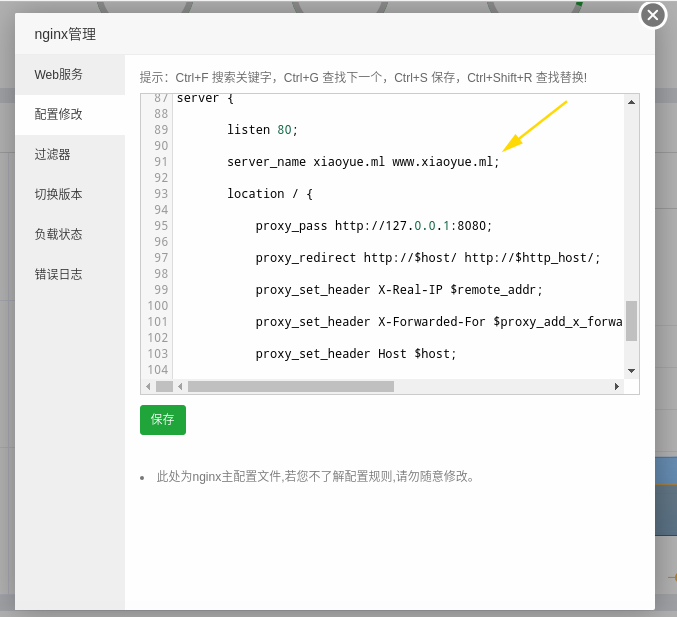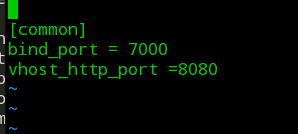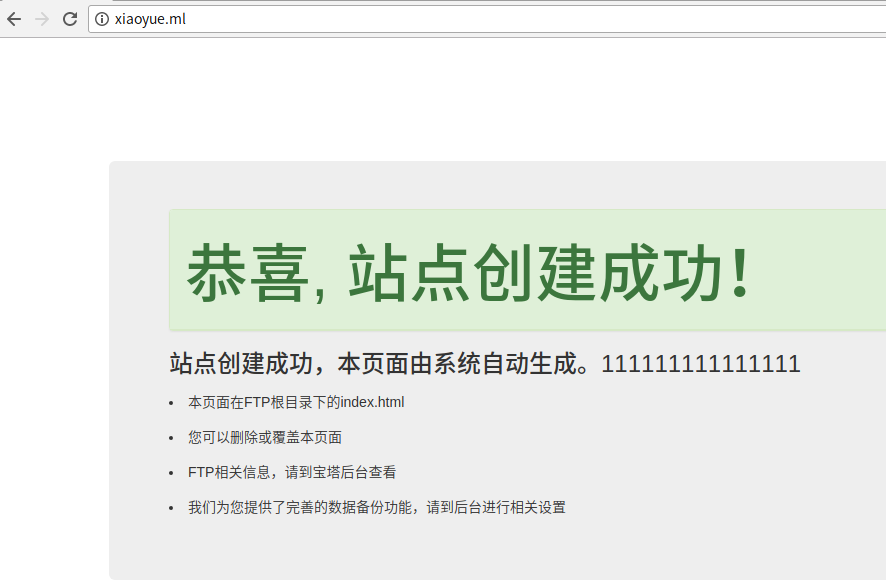 Operation and Maintenance
Operation and Maintenance
 Nginx
Nginx
 How to configure nginx to ensure that the frps server and web share port 80
How to configure nginx to ensure that the frps server and web share port 80
How to configure nginx to ensure that the frps server and web share port 80
First of all, you will have a doubt, what is frp? Simply put, frp is an intranet penetration tool. After configuring the client, you can access the intranet through the server.
Now my server has been built with nginx, and there is only one port 80. So what should I do if the frp server also wants to use port 80?
After querying, this can be achieved by using nginx's reverse proxy.
To add: frps is the server (server), frpc is the client (client).
Step one: Modify the nginx.conf configuration file in the server
Add the following parameters in http{ } in nginx.conf,
server {
listen 80;
server_name xiaoyue.ml www.xiaoyue.ml;
location / {
proxy_pass http://127.0.0.1:8080;
proxy_redirect http://$host/ http://$http_host/;
proxy_set_header x-real-ip $remote_addr;
proxy_set_header x-forwarded-for $proxy_add_x_forwarded_for;
proxy_set_header host $host;
}
} As shown below, save the settings and restart nginx

Step 2: Modify the frp server configuration file
Since the reverse proxy has reached port 8080, the configuration file of the frp server also needs to be set
vhost_http_port = port 8080 in the frps.ini configuration file

The third step: Modify the frp client configuration file
The first step is configuring: server_name xiaoyue.ml www.xiaoyue.ml; Fill in the corresponding domain name here.
also supports pan-parsing, for example: server_name *.xiaoyue.ml; the domain name needs to be pan-parsed at the same time.
So how to modify frpc.ini, it’s very simple
Configure the corresponding domain name in the corresponding penetration service configuration, custom_domains = xiaoyue.ml

Step 4:
Restart frps on the server, start frpc on the local computer, and you can pass 80 in the browser The port directly accesses xiaoyue.ml.

Additional 1:
xiaoyue.ml is parsed to my server, and this website is built in the LAN in my own computer.
That is to say, first make sure that you access 127.0.0.1 on your computer and there is content.
Additional 2:
The reverse proxy in the first step can also be done like this
Pagoda background
1) Website -->Add a site, enter your domain name
For example, enter the added domain name xiaoyue.ml Submit
2) Click Settings-->Reverse proxy
Target Fill in http://127.0.0.1:8080 in the url, please do not enter the wrong
Choose to enable reverse proxy
ps: Are you a little confused? . .
In fact, the core of this article is just one step, which is to reverse proxy to xiaoyue.ml:8080 port when you visit xiaoyue.ml (by default, we access the website through port 80).
Then what’s the point of doing this? I just want to access the website directly through the domain name instead of accessing the website through the domain name:port number.
The above is the detailed content of How to configure nginx to ensure that the frps server and web share port 80. For more information, please follow other related articles on the PHP Chinese website!

Hot AI Tools

Undresser.AI Undress
AI-powered app for creating realistic nude photos

AI Clothes Remover
Online AI tool for removing clothes from photos.

Undress AI Tool
Undress images for free

Clothoff.io
AI clothes remover

AI Hentai Generator
Generate AI Hentai for free.

Hot Article

Hot Tools

Notepad++7.3.1
Easy-to-use and free code editor

SublimeText3 Chinese version
Chinese version, very easy to use

Zend Studio 13.0.1
Powerful PHP integrated development environment

Dreamweaver CS6
Visual web development tools

SublimeText3 Mac version
God-level code editing software (SublimeText3)

Hot Topics
 1377
1377
 52
52
 What's wrong with nginx running for a while?
Apr 14, 2025 am 07:18 AM
What's wrong with nginx running for a while?
Apr 14, 2025 am 07:18 AM
The reasons why nginx hangs up after running for a period of time: 1. Memory leak; 2. Configuration error; 3. Insufficient resources; 4. External factors. Solution: 1. Diagnose memory leaks; 2. Fix configuration errors; 3. Provide more resources; 4. Exclude external factors.
 How to implement nginx load balancing
Apr 14, 2025 am 07:21 AM
How to implement nginx load balancing
Apr 14, 2025 am 07:21 AM
Nginx load balancing defines backend servers through the upstream module and uses the location block to proxy the request to these servers. Supports load balancing strategies such as polling, minimum number of connections, response time weighting, and ip_hash. Configuration examples include defining an upstream group and pointing to it using the proxy_pass directive.
 nginx restart command
Apr 14, 2025 am 07:27 AM
nginx restart command
Apr 14, 2025 am 07:27 AM
nginx restart command: sudo systemctl restart nginx. Other related commands include: 1. Start: sudo systemctl start nginx; 2. Stop: sudo systemctl stop nginx; 3. Check status: sudo systemctl status nginx.
 Apr 14, 2025 am 07:36 AM
Apr 14, 2025 am 07:36 AM
Nginx Autoindex is a function of generating directory listing HTML pages, which is used to browse files and view file information when requesting directories instead of files. It can be customized with configuration options such as displaying the exact file size, local time, and custom page format. Advantages include easy browsing, easy configuration and providing file information. Disadvantages include security risks, performance impact, and the inability to customize the appearance of the page.
 What is the reason for nginx403
Apr 14, 2025 am 07:39 AM
What is the reason for nginx403
Apr 14, 2025 am 07:39 AM
nginx 403 error indicates that the client does not have permission to access the resource. Factors that cause this problem may include: permission settings, nginx configuration, CGI script errors, .htaccess files, or other reasons. Troubleshooting steps include: checking permission settings, reviewing nginx configuration, testing CGI scripts, checking .htaccess files, excluding firewalls or security software, and checking servers and file systems.
 How to configure virtual hosts in nginx
Apr 14, 2025 am 08:15 AM
How to configure virtual hosts in nginx
Apr 14, 2025 am 08:15 AM
Configuring nginx virtual host allows multiple websites to be hosted on a single server, each with a separate domain name and root directory. The specific configuration steps include: creating a virtual host configuration file to configure the server block, specifying the server listening port, virtual host domain name and document root directory to enable the virtual host, and linking the configuration file to the enabled directory to reload nginx
 The relationship between nginx and web server
Apr 14, 2025 am 07:09 AM
The relationship between nginx and web server
Apr 14, 2025 am 07:09 AM
nginx is a lightweight, non-blocking web server and reverse proxy, commonly used for front-end proxy, load balancing, and caching. Its relationship with a web server is usually: Front-end proxy: nginx handles requests and forwards them to the back-end server. Load Balancer: nginx distributes requests to multiple backend servers. Caching: nginx caches frequently accessed files for performance.
 How to redirect in nginx
Apr 14, 2025 am 08:42 AM
How to redirect in nginx
Apr 14, 2025 am 08:42 AM
Methods for redirecting through Nginx are 301 permanent redirects (update links or mobile pages) and 302 temporary redirects (handling errors or temporary changes). Configuring redirection involves using location directives in server blocks, advanced features include regular expression matching, proxy redirection, and condition-based redirection. Common uses of redirects include updating URLs, handling errors, redirecting HTTP to HTTPS, and guiding users to a specific country or language version.



